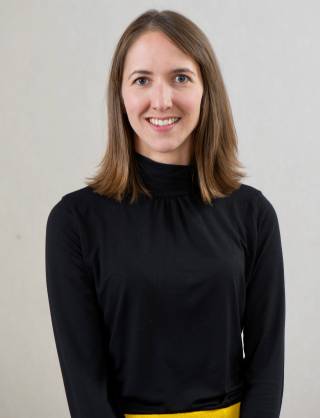
Victoria Bates
Victoria Bates is Associate Professor in Modern Medical History at the University of Bristol. Her research expertise ranges from nineteenth-century forensic medicine to current-day sensory studies. Victoria’s Future Leaders Fellowship, ‘Sensing Spaces of Healthcare’ (UKRI, 2020-24/27), brings together history, medical humanities, spatial/sensory studies and design for the first time. Her most recent book is in the Cambridge University Press ‘Elements in Histories of Emotions and the Senses’ series: Making Noise in the Modern Hospital (2021).
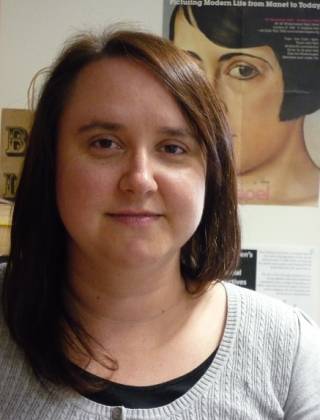
Kate Bradley
Kate Bradley is a Reader in Social History and Social Policy at the University of Kent. Kate’s research focusses on the relationships between charities, activist groups and the welfare state in Britain in the twentieth century. Her first book, Poverty, Philanthropy and the State: Charities and the Working Classes in London 1918-1979 (Manchester UP, 2009) looked at the settlement house movement in London, and her second, Lawyers for the Poor: Citizenship, Voluntary Action and Legal Advice in England 1890-1990 (Manchester UP, 2019) explored the provision of legal aid before and after the introduction of a state-funded scheme in 1949. At HEX in April 2022, Kate is working on a new project on the ways in which telephone technology was used to make both voluntary and state welfare services more accessible.
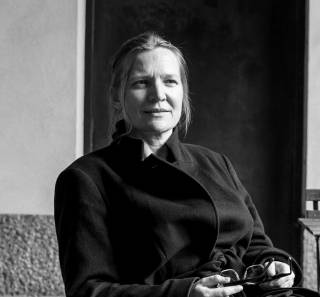
Mette Buchardt
Professor and Director of Centre for Education Policy Research, Aalborg University, Aalborg and Copenhagen, Denmark
Buchardt’s research comprises the interdisciplinary field of welfare- and social-state history, church history and the history of education with an emphasis on 18th to 20th century. She specializes in the relation between education- and social reform in the European states in a global perspective, e.g. the political project of modernization and secularization, and the influence of migration on the development of welfare state policy and politics.
She has been holding visiting professorships and scholarships at e.g. the history departments at University of Jyväskylä, Stockholm University and Umeå University, and at Nordeuropa-Institut, Humboldt University, Dept. of Curriculum & Instruction, University of Wisconsin-Madison, and Section for Church History, University of Oslo.
Buchardt has published extensively on the Nordic welfare states, including in a history of emotion perspective, e.g. Buchardt, M., Kärnebro, K., & Osbeck, C. (2022). “Outer space” as Cold War spirituality: Students’ drawings and texts on “life questions” in 1980s welfare-state Sweden . IJHE. Bildungsgeschichte. International Journal for the Historiography of Education. Also she has recently published e.g. “The Nordic Model and the Educational Welfare State in a European Light: Social Problem Solving and Secular-Religious Ambitions when Modernizing Sweden and France”, Tröhler et al (eds.) The Nordic Education Model in Context: Historical Developments and Current Renegotiations, Routledge 2023.
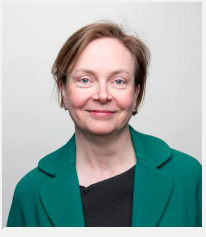
Caitríona Beaumont
Professor
Caitríona Beaumont is Professor of Social History at London South Bank University (LSBU), UK. She is an expert on the history of female activism, female networks and women’s social movements in Ireland and Britain in the nineteenth and twentieth century. Her first book, Housewives and Citizens: Domesticity and the Women’s Movement in England 1928-1964 was published by Manchester University Press in 2013. She has published numerous articles and chapters, and contributed to websites and other public forums, for example the British Library, and you can view her recent publications here: https://peoplefinder.lsbu.ac.uk/researcher/80226/professor-caitriona-beaumont
Caitríona is currently working on four research projects. With Dr Eve Colpus and Dr Ruth Davidson she is co-editor of the forthcoming book Histories of Welfare in Modern Britain: experiential expertise, activism and action (Palgrave Series in the History of Experience) and it is this project that brings her to HEX as a visiting fellow, March-April 2023. This collection offers a new approach to the history of welfare in Britain through its examination of how individuals themselves used ‘experiential expertise’ to support their own welfare.
She is Principal Investigator (PI) on the UK Research Innovation (UKRI) and LSBU funded collaborative network ‘Afterlives: tracing the life stories of activist women after revolution and civil war in Ireland, Germany and Finland, 1918 to 1980s’ (2023) and on the UK Arts and Humanities Research Council (AHRC) funded international research network ‘Agency and Advocacy: Locating Women’s Grassroots Activism in England and Ireland, 1918 to the present’ (2023/2025). She is also working on a new research project uncovering lessor known and intergenerational female activism in Britain during the period 1960s to 1980s.
Caitríona is an elected trustee and council member of the Royal Historical Society and sits on the editorial boards of a number of international journals. You can follow Caitríona on twitter at @caitbeaumont.

Carmen Chamarro
PhD Student
Carmen Chamarro is a Predoctoral Fellow and Research Assistant at the Complutense University of Madrid. Her research interests address gender history and the history of masculinities in relation with the bourgeois discourse of respectability in 19th century Spain. Currently immersed in the research for her doctoral thesis project, titled The bourgeois ideal of fatherhood: attitudes, discourses, and practices in 19th-century Spain (1830-1890), she is part of the research project “La respetabilidad burguesa y sus dinámicas culturales, 1830-1890” [REF. PID2022-136358NB-I00] and a member of the research group “La España liberal, 1833-1890” [https://www.ucm.es/laespanaliberal-1833-1890/]. As a doctoral candidate she has participated in various conferences with papers related to her research in the history of masculinities and femininities in 19th-century Spain. As a Visiting Fellow at HEX (autumn 2024), Carmen is focusing her study on how emotions and affections could have shaped male identities represented through different fatherhood experiences.
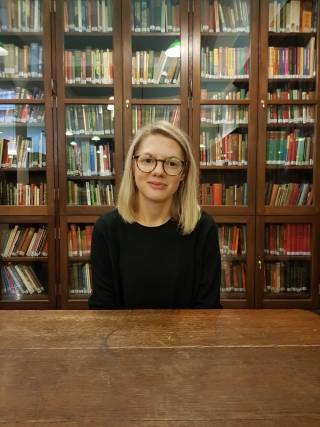
Eve Colpus
Associate Professor
Eve is a cultural historian of modern Britain, based at the University of Southampton, UK. Her particular research interests are in histories of childhood and youth, histories of technology use, gender history, and histories of voluntary action. During her time as a Visiting Fellow at HEX she has been working on the collection, Histories of Welfare in Modern Britain: Experiential Expertise, Action and Activism, co-edited with Caitríona Beaumont and Ruth Davidson and forthcoming with Palgrave Macmillan, 2024. This collection offers a new approach to the history of welfare in Britain through its examination of how individuals themselves used ‘experiential expertise’ to support their own welfare. Eve is Principal Investigator on the project, ‘Children and young people’s telephone use and telephone cultures in Britain, c. 1984-1999’, funded by the Arts and Humanities Research Council (2021-2024). She is currently writing an article on this project exploring the experience of children’s encounter with the telephone kiosk (public telephone) in 1980s and 1990s Britain. Linked to this project, Eve has co-organised the workshop, ‘Children, media and communication: new histories of experience’, with Heidi Kurvinen and Antti Malinen, sponsored by HEX and the Society for the History of Children and Youth (SHCY).
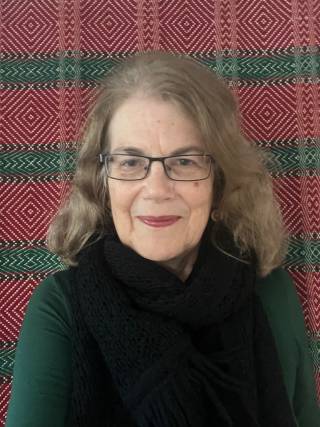 Heather Dalton
Heather Dalton
Honorary Research Fellow
Heather Dalton (Ph.D, FRHistS) is a Honorary Research Fellow in the School of Historical and Philosophical Studies at the University of Melbourne, and also a member of The Cabot Project at the University of Bristol (http://www.bristol.ac.uk/history/research/cabot.html). Her research focuses on relationships in maritime trading networks in the Atlantic c. 1450-1650, as well as early contacts between the Indo-Australian Archipelago and Europe. Her recent work on Australasian cockatoos in Medieval and Renaissance European artworks has aroused much scholarly and public interest. As a Visiting Fellow at HEX, Heather is focusing on the lived religious experiences of merchants from the British Isles in the Mediterranean and Atlantic post 1530.
Article: How Did the Cockatoo Reach 13th Century Sicily?
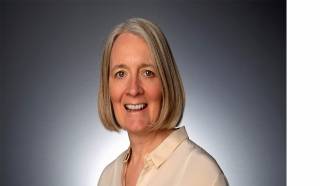 Ruth Davidson
Ruth Davidson
Ruth Davidson is a historian of social policy, gender and activism. She is currently completing a book which draws together her long-standing research and published work into women’s politics, activism and experiences of welfare. Challenging women’s poverty and dependence: The expertise of experience in Britain, 1900s-2000s, will make for a productive point of departure from traditional chronologies and narratives of British welfare policy. This draws on her PhD, which explored women’s grassroots welfare campaigns, and more recent work on women’s social research and pressure group activism within the welfare state.
As a core member of the Project Steering Committee, she has worked on the development of a successful AHRC funding application with Caitríona Beaumont (PI), Anne Logan (CI) and Anna Muggeridge for a new international research network entitled ‘Agency and Advocacy: Locating women’s grassroots activism in England and Ireland, 1918 to the present’. During her time as a Visiting Fellow at HEX she has been working on the collection, Histories of Welfare in Modern Britain: Experiential Expertise, Action and Activism, co-edited with Caitríona Beaumont and Eve Colpus (forthcoming with Palgrave Macmillan, 2024). This collection offers a new approach to the history of welfare in Britain through its examination of how individuals and groups use ‘experiential expertise’ to support their own welfare. She is also currently working with colleagues from the Mile End Institute, Lyndsey Jenkins, Anna Muggeridge and Farah Hussain, on a new edited collection Women in British Politics since 1945 and a special issue of Women’s History Review ‘Women’s Grassroots Activism in Britain since 1945’ (forthcoming, 2024).
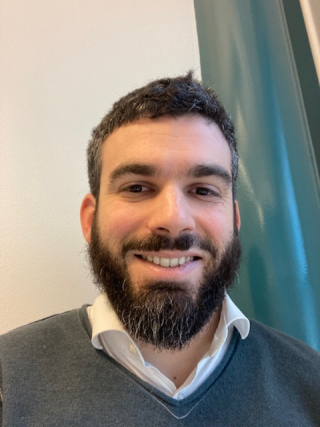
Pierre-Marie Delpu
Pierre-Marie Delpu is a FRS-FNRS researcher at the Université Libre de Bruxelles and a visiting fellow at HEX in February 2023. His work focuses on political martyrdom in the 19th century, particularly in southern Europe (Italy and Spain). On that topic, he has already published L’affaire Poerio. La fabrique d’un martyr révolutionnaire européen 1850-1860 (Paris: CNRS Éditions, 2021) and is about to publish Les nouveaux martyrs XVIIIe-XXe siècle (Paris: Passés Composés, upcoming in Fall 2023) and editing Mutations et usages du martyre politique. Europe méridionale XIXe-XXIe siècle (Madrid: Casa de Velázquez, upcoming in 2024). Since January 2023, he coordinates with Silvia Cavicchioli, Pierre Géal and Raquel Sánchez the research program AMAPOL (Questions on Political Martyrdom, Southern Europe 1800-1939: Constructions, Uses, Representations). At HEX, he is interested in the experiences of public death through the last words of political martyrs in the mid-19th century.
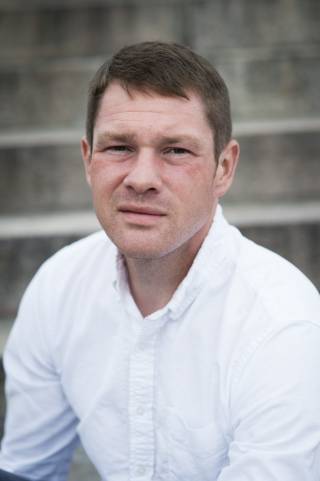
Thomas Devaney
Associate Professor
Thomas Devaney is Associate Professor of History at the University of Rochester and Visiting Researcher at HEX (spring/summer 2021). He has held fellowships at the Helsinki Collegium for Advanced Studies and at the University of Turku, among others. As a scholar of late medieval and early modern cultural history, his research encompasses interfaith relations, urban spectacle, sport, concepts of nobility, and early modern understandings of sense and emotion. His work has been published in Speculum, Medieval Encounters, Viator, and elsewhere, and he is also author of Enemies in the Plaza: Urban Spectacle and the End of Spanish Frontier Culture, 1460-1492 (University of Pennsylvania Press, 2015). At HEX, he is focusing on lived religion, particularly the experience of local pilgrimage in early modern Spain. By examining the ways in which pilgrims presented their memories in terms of intense emotions and how these accounts correlated with contemporary theological debates about sensory perception, the meanings of religious emotions, and the power of sacred material objects, he aims to understand pilgrimage as a sensual, emotional, social, and textual experience.
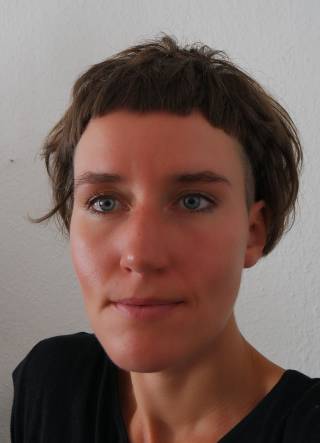
Claudia Eggart
Claudia Eggart is a sociologist and social anthropologist, currently doing her Ph.D. at the University of Manchester. Her research engages with emotions, mobility and border regimes, crisis, and the social production of space and time with a special focus on post-Soviet market transformation. She has extended ethnographic research experience in Russia and Kyrgyzstan and is currently undertaking oral histories with market traders from Odesa, Ukraine, and Bishkek, Kyrgyzstan. In her doctoral research project, she is interested in the intersection of large-scale geopolitical transformations (e.g. the Chinese Belt and Road Initiative, the Russian-led Eurasian Economic Union, or the European Union) and lived geopolitics at the market, across borders, and in times of crisis.
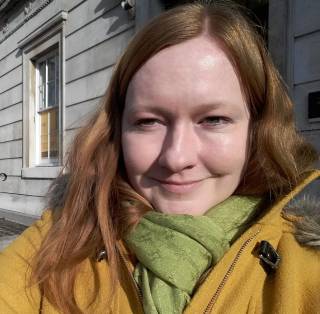
Heather Ellis
Heather Ellis is Associate Professor in History of Education at the University of Sheffield. Heather’s research focuses on the history of education, knowledge and the lived welfare state. Her first book, Generational Conflict and University Reform: Oxford in the Age of Revolution (Brill, 2012) explored the role of student movements at Oxford in the early nineteenth century and her second, Masculinity and Science in Britain, 1831-1918 (Palgrave Macmillan, 2017) examines the gendered nature of scientific knowledge in Victorian Britain. She is currently Co-Investigator on a major ESRC-funded project ‘The UK School Meals Service: Past, Present, and Future?’ (2023-2025) which combines archival research, oral histories and ethnography to explore the history and possible futures of school meals in the UK. At HEX in April and May 2025, Heather is exploring the history of school meals in an international context as well as working on a monograph based on the ESRC-funded research.
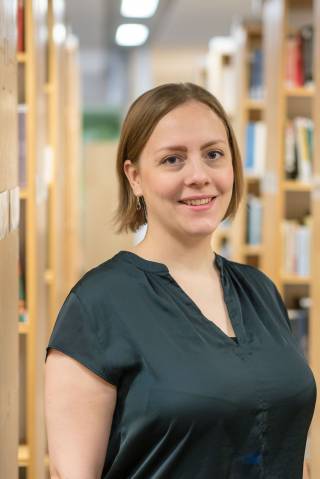 Mari Eyice
Mari Eyice
Postdoctoral Researcher
Mari Eyice is a postdoctoral researcher and a guest at HEX during the Autumn of 2020 (remotely) and during 2022 (hopefully on site in Tampere). Her research concerns questions of emotions, body and religion in the early modern period. She has done her doctoral work on emotional practices in the Swedish Reformation and is currently working on a three year-project on empathy and disability in the early modern period.
 William Foster
William Foster
Professor
Throughout my career I have been interested in what individual lives reveal of large-scale social and political entities such as nations, empires, and superpowers. My early work was focused on the question of transculturation and conversion, specifically the experiences of a group of English Protestants in Colonial North America who voluntarily became Catholic and French, exploring along the way the French empire’s negotiation of the unexpectedly complex cultural environments it encountered. Over the past ten years I have researched interactions among of ordinary Russians and Americans from the 18th century to the near-present, to see what the lived experience of those encounters reveals of the long rivalry between the two nations-into-superpowers and their mutually formed senses of exceptionalism in the world. My new research concerns the historical roots of the lived experience of armed neutrality in Switzerland and Austria, as well as armed post-neutrality in Finland and Sweden. I am interested in how resistance to threats by empires and larger nations express themselves in changing relations between the individual citizens and their states, particularly as expressed through conscription and other social obligations.
I am also an Associated Researcher at the Institute for European Global Studies, University of Basel, Switzerland.
 Andreas Eliassen Grini
Andreas Eliassen Grini
PhD Student
Andreas is a PhD student at the Department of Modern History and Society at NTNU, Trondheim, Norway. He has a background in History and German studies, where he respectively looked at German war memoirs from Norway during World War II and the (re)presentation of Jewish protagonists in post-war German novels. In his PhD project, Andreas examines the national socialist views on the indigenous people of the Sámi, as well as the different contact interfaces between the Sámi and the German occupational forces in Norway during WW2. The project employs a variety of methodological and theoretical perspectives, one of them being history of experience. During his stay at HEX, Andreas focuses both the role of the Wehrmacht in Northern Finland, as well as the transnational experience of the Sámi during the World War.

Sara Honarmand Ebrahimi
Humboldt Research Fellow
Sara Honarmand Ebrahimi is an interdisciplinary architectural historian. She is currently a Humboldt Research Fellow at Goethe University Frankfurt am Main. Previously, she was a Postdoctoral Research Fellow at the School of Architecture, Planning and Environmental Policy, University College Dublin (2021-22), and a Paul Mellon Centre for Studies in British Art Postdoctoral Fellow at the School of Architecture and Landscape Architecture, the University of Edinburgh (2019-20). She studied for her PhD in University College Dublin, where she was an Irish Research Council (IRC) doctoral scholar. Her research interests address the multifaceted origins of ideas and practices in the history of international health and architecture and consider the history of emotions as a way of doing architectural history. Her first book entitled, Emotion, Mission, Architecture: Building Hospitals in Persia and British India, 1865-1914, will be published by Edinburgh University Press in November 2022.

Ofer Idels
Postdoctoral Researcher
Ofer Idels is a Postdoctoral Fellow at the Ludwig Maximilian University of Munich, History Department. His work focuses on issues of language, embodiment, space and emotions in Modern Jewish History. In particular, he’s interested in the history and historiography of sports, revolutions and globalization.
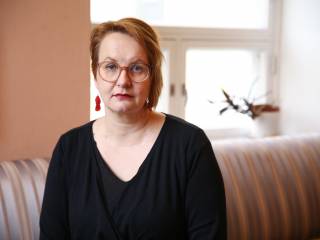
Ulla Ijäs
Postdoctoral Researcher
Postdoctoral researcher Ulla Ijäs is currently working in a project which studies a nineteenth-century Lutheran priest, his work and social networks in the Parikkala parish in eastern Finland. Ijäs is also participating EU Cost Action network Women on the Move and a research project Mobility of Words and the Places of Knowledge. Learned Communities in Early Nineteenth-Century Finland, which is supported by the Kone Foundation.
Her research interests are urban elites, material culture, gender history and economic and social history prior and during the Industrial Revolution. Geographically, Ijäs´ research area is the Northern Baltic (Finland and the Russian Baltic provinces).
During the HEX fellowship period, Ijäs aims to gain deeper understanding, what the history of experience would offer to her study especially concerning the social networks of a priest and his family. Ijäs would like to participate into the discussion of how the studied German-speaking Rönnholm family, originating from the transnational urban elite, built the Finnish nation in peripheral area of eastern Finland, far from intellectual centers, during the early years of the nation building in Finland. Ijäs would also like to discuss how Rönnholm’s experiences as priest, working towards both religious and secular aims, had impact on the nation building processes at the local level. With her research material, Ijäs is able to contribute both the Lived Nation and Lived Religion themes in HEX.
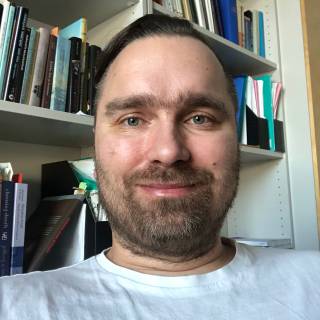
Kalle Kananoja
Postdoctoral Researcher
Kalle Kananoja is a senior research fellow at the University of Oulu and visiting researcher at HEX (February 2021). He has previously worked as a lecturer in African studies at the University of Helsinki and held fellowships at the European University Institute, King’s College London and the John Carter Brown Library. He has published on the social and cultural histories of slavery and medicine in the early modern Atlantic world, including the recent monograph Healing Knowledge in Atlantic Africa (Cambridge University Press, 2021). At HEX, he will work on the history of health and lived medicine in early twentieth-century Owamboland, South West Africa.
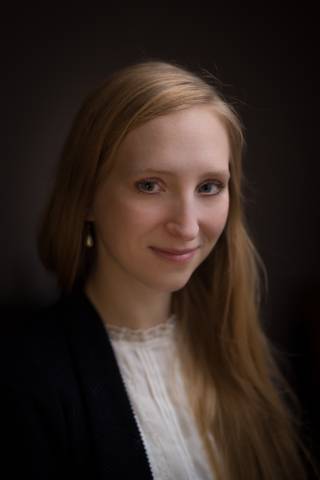
Jaśmina Korczak-Siedlecka
Postdoctoral Researcher
Jaśmina Korczak-Siedlecka is a postdoctoral Research Fellow at the German Historical Institute in Warsaw. She specializes in social history of the early modern period; her latest book examines violence in everyday life of villagers on the southern Baltic coast in the 16th-17th centuries. She is currently investigating Lutheranism in rural communities in the northern part of the Crown of the Kingdom of Poland. She is developing her research at HEX in February 2023.

Karolina Kulpa
PhD Student
Karolina Kulpa — PhD student at the Doctoral School of Humanities at the University of Warsaw, with a background in philosophy and literary studies. Her doctoral project investigates the engagements of the lower social classes in the creation of the national identity and the collective imaginaries in interwar Poland, paying particular attention to the role of literature and the press in those processes. Taking “populist modernism” as a critical point of entry, she explores the interactions of modernization and political narrative with symbolic representations of “the people” in various nation-building projects.
Firmly based on literary studies, her work integrates the history of concepts with the history of emotions and ideology; she discusses how such emotions as sympathy, awe, and disillusionment were mobilized in literary criticism, intellectual debates, and artistic texts in order to establish political and cultural meanings.

Jin Hui Li
Associate Professor
Jin Hui Li is Associate Professor in Education Science at the Centre for Education Policy Research, Aalborg University Copenhagen. She holds a Ph.D. in education sociology and education policy history. Within education policy history research, Li’s scholarly interest is situated at the intersections of education, transnational migration, and state-citizen relations within the welfare nation-state. Her Ph.D. project explored the development of the nation-state and student identities in transnational higher education, and her most recent research investigates the welfare state’s historical and contemporary policy practices of crafting migrant children into citizens through education. Li has worked with the history of experience in the Nordic welfare states by focusing on how the migrant students’ lived experience of schooling is shaped through race, class, and gender since the 1960s’. Her recent publications are e.g. Li, J. H., & Buchardt, M. (2022). “Feeling strange” ‒ oral histories of newly arrived migrant children’s experiences of schooling in Denmark from the 1970s. Paedagogica Historica, 1–19 and Li, J. H. (2021). The lived class and racialization – histories of “foreign workers’ children’s” school experiences in Denmark. Nordic Journal of Studies in Educational Policy, 7(3), 190–199.
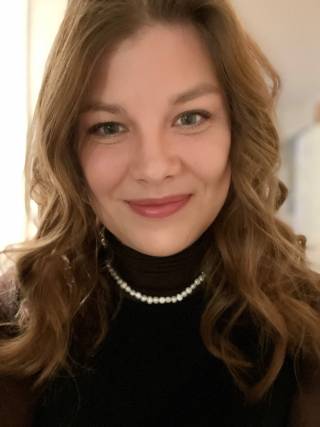
Amalie Olga Lyngsted
Amalie Olga Lyngsted is a PhD student in history at the University of Copenhagen and the Danish National Archives. She previously visited the University of Oxford as a recognised PhD student in the spring of 2024 and is a visiting researcher at HEX in March 2025. Her PhD project examines the experience of children placed in care in early 20th century Denmark, with a focus on the children and young people’s relationships with the different people in their lives. By employing a history of experience approach, the project examines the history of care from the perspectives of the children who grew up in it. Her research interests include the history of care, the history of children and childhood, the history of emotions and experience, as well as perspectives on the examination of children’s voices. The project is funded by the Danish Independent Research Foundation.
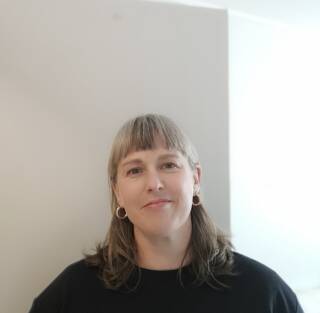
Beth Marsden
Postdoctoral Researcher
Beth is a non-Indigenous historian of settler colonialism and Indigenous education in Australia. Her other research interests include histories of childhood, and patterns of historical discrimination in government systems, such as education, housing, and health. Beth is currently a post-doctoral research fellow at the Australian National University in Canberra and is working on a national history of Indigenous schooling in Australia. During her time at HEX, Beth will be examining experiences of travelling for school—by choice, coercion, or force—to illuminate the different ways that schooling has been accessed by Indigenous and non-Indigenous children.

Dolorès Martin Moruno
Assistant Professor
Dolores Martín Moruno is assistant professor at the Institute for Ethics, History and Humanities of the University of Geneva. She is the principal investigator of the SNSF Professorship project Those women who performed humanitarian action: a Gendered history of compassion from the Franco-Prussian war to WWII (2017-2021), its extension Lived Humanitarianism : Gender, experiences and knowledge(s) (1853-1945), as well as the SNSF Agora scientific communication project Beyond Compassion: Gender and Humanitarian Action. She has widely published on the history of emotions.
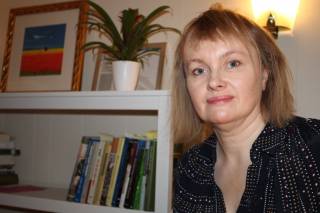 Sigríður Matthíasdóttir
Sigríður Matthíasdóttir
Sigríður Matthíasdóttir, is a Ph.D (Dr.Phil). from the University of Iceland and is an independent historian at the Reykjavík Academy (www.akademia.is). Her research has covered gender history, nationalism, university history and emigration and she has published widely on these issues. She is a co-author of Aldarsaga Háskóla Íslands 1911-2011 (The Hundred Year History of the University of Iceland 1911-2011). She has also been a Fulbright visiting researcher at the University of California, Santa Barbara (UCSB) in 2007 and a visiting researcher the Historical Faculty of University of Stockholm in 2017. She has also been several times for a shorter period at the Historical Faculty of Åbo Akademi in Finland.
Since 2013 she has been doing a research on the theme single women who emigrated from Iceland to North-America 1870-1914, which for example received a three years grant from the Icelandic Research Fund 2013-2015. As a continuation of that research she is now writing a biography about two female merchants from East Iceland, Pálína S. Gudmundsdóttir Waage (1864-1935) and her granddaughter Pálína Kr. Thorbjörnsdóttir Waage (1926-2005). The biography, based on personal sources, is a story about transnational relations and emigration to North America as well as female entrepreneurship. This research focuses especially on these women´s agency, for example in relation to how it was shaped by their “lived religion” and “lived nationalism / transnationalism”. It has been funded by several grants, for example from The Non-Fiction Writers’ Fund and the Icelandic Equality Fund.
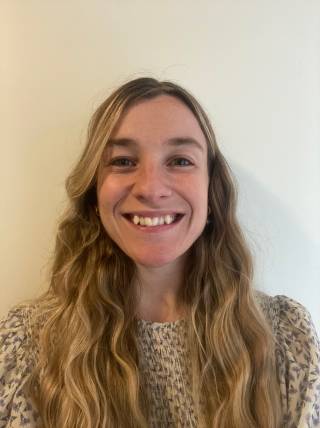 Kamilla Matthiassen
Kamilla Matthiassen
Kamilla Matthiassen is studying in HEX as an Erasmus visitor from the University of Aalborg and is currently doing her master thesis. Her research interest are criminology and criminal history in the 19th century, the development of the justice system in northern Europe and the modern turn prisons underwent during this period (from open workhouses to closed penitentiaries which practiced isolation and moral improvement). The focus of her study is how the regular, poor people experienced this modernization and institutionalization. In the last year she has been working on a quantitative project based on the prison roll from the Danish penitentiary ‘Vridsløselille’, where she investigates the prisoners in the late 1800s, their former lives, their experience with prison, their recidivism and intern criminal networks. Kamilla is going to stay at HEX this semester (sept-dec 2023), where she will be working with Johanna Annola. Together they will investigate and compare the female prisoners of Finland and Denmark and hopefully deliver a more nuanced insight to the two nations, their criminal system and the life and possibilities of women in this time.
 Wiktor Marzec
Wiktor Marzec
Assistant Professor
Wiktor Marzec received his PhD from the Central European University, Budapest. He is an Assistant Professor and project leader in The Robert Zajonc Institute for Social Studies, University of Warsaw, Poland. He is the author of Rising Subjects. The 1905 Revolution and the Origins of Modern Polish Politics (Pittsburgh UP, 2020), co-author of From Cotton and Smoke. Łódź – Industrial City and Discourses of Asynchronous Modernity, 1897–1994 and several articles on Poland within the Russian Empire focusing on labor history and history of concepts. Currently, he runs a comparative project on political trajectories of the late tsarist borderlands.
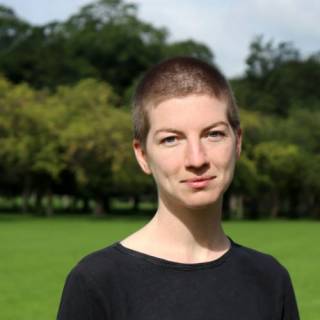 Ismay Milford
Ismay Milford
Postdoctoral Researcher
Ismay Milford is a historian of East Africa’s twentieth-century global connections and a visiting postdoctoral researcher at HEX (October-December 2020). She is normally based at the University of Edinburgh, where she is preparing her first monograph on anticolonial networks during the 1950s and contributing to a Leverhulme-funded project ‘Another World? East Africa and the global 1960s’. At HEX she is researching the spiritual movement ‘Moral Re-Armament’ and exploring how a history of experience approach could inform her new project on the ‘information sector’ in East Africa.

Ian Miller
Ian Miller is Lecturer in Medical History at Ulster University, Northern Ireland. He has authored 6 medical history books on topics including the force-feeding of hunger strikers, post-Famine dietary change in Ireland and the history of the Victorian stomach. Ian is PI on Epidemic Belfast (AHRC-funded) (www.epidemic-belfast.com), ‘Feeding Children? Food Poverty across Ireland’ (AHRC-funded) and co-PI (with Prof. Gerard Leavey, UU) on an major AHRC grant tackling health disparities for people living with mental illness in Northern Ireland.
Ian has previously held visiting fellowships at the Max Planck Centre for the History of Emotions (Berlin), INSERM (Paris) and Institute for General Practice and Community Medicine (Oslo). Ian’s work has featured in Guardian, Independent, London Review of Books, New Yorker, Sunday Times, Sunday Post, Irish Times, Times Literary Supplement among many others. Ian has appeared on a number of BBC and RTÉ stations. Ian is Book Review Editor for the journal Social History of Medicine, Senior Fellow of HEA, and appointed member of Royal Irish Academy (Historical Studies), AHRC Peer Review College member, Irish Research Council Board (postgraduate and postdoctoral) and Wellcome Trust Discovery Research Funding Committee.
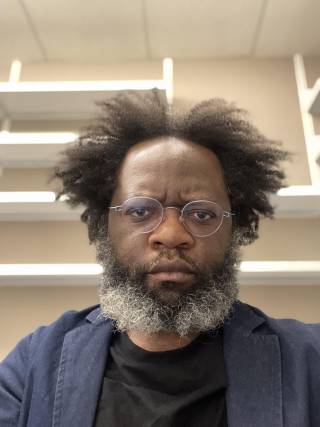
Tinashe Mushakavanhu
Tinashe Mushakavanhu is a Junior Research Fellow in African & Comparative Literature at St Anne’s College, University of Oxford and Visiting Assistant Professor in Comparative Literature at New York University (Spring 2023). He has widely published on the literary histories of his homeland, Zimbabwe with a special focus on writer’s archives, cultural institutions and publishing. His previous publications include Reincarnating Marechera: Notes on a Speculative Archive (2020) and Some Writers Can Give You Two Heartbeats (2019). At HEX, he is working on a book about the stone sculpture movement in Zimbabwe tentatively called, The Stone Philosophers.
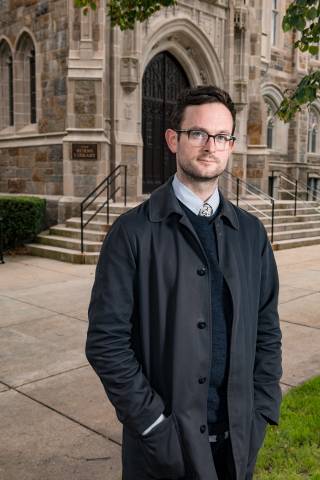 Ciaran O´Neill
Ciaran O´Neill
Ciaran O’Neill is Ussher Associate Professor of Nineteenth-century History at Trinity College Dublin. He specialises in the transnational history of class, mobility, and elite formation, colonial legacies, and public history.
He has held visiting fellowships at Boston College, the University of Notre Dame, St Mary’s University (Nova Scotia), and the Universidade de São Paulo, and has contributed to major projects on colonial legacies, public history, and cultural memory.
O’Neill has published extensively on Irish elites and imperial entanglements, including Catholics of Consequence (OUP, 2014) and Power and Powerlessness in Union Ireland (OUP, 2024), as well as recent work on Ireland, slavery, and the Atlantic world in Ireland, Slavery and the Caribbean (MUP, 2023) and Public History in Global Perspective (De Gruyter, 2025).
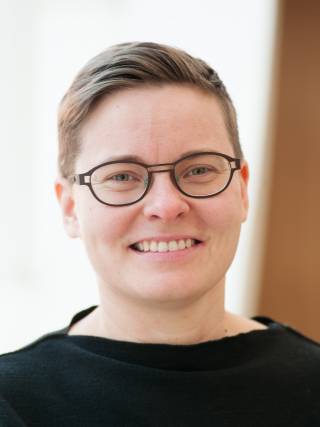 Anna Rajavuori
Anna Rajavuori
Postdoctoral researcher
Anna Rajavuori is a political historian at the University of Helsinki and a visiting post-doctoral researcher at HEX in March 2021. Her research project “Parliament as a Stage: Audiences, Emotions and politics of Performance in the Finnish Parliament in the 1907-1920” is funded by Kone Foundation. In her PhD thesis, she studied socialist agitation in rural central Finland in 1906-1908 and is interested in politics and performance, emotions and political movements.
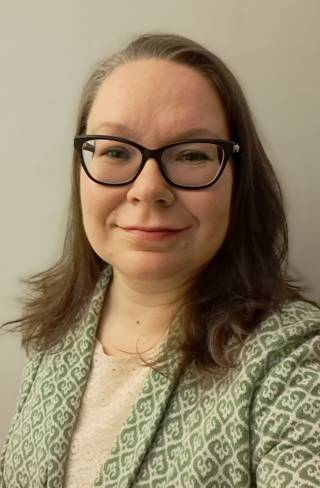 Päivi Räisänen-Schröder
Päivi Räisänen-Schröder
Academy research fellow
Päivi Räisänen-Schröder is a historian of early modern religiosity who has studied practices, narratives and identities of Anabaptists, Lutherans as well as Jesuits from the 16th to the 18th centuries. She is currently a Finnish Academy Research Fellow with a project that explores emotions and the formation of religious practices and identities in the German Reformation.
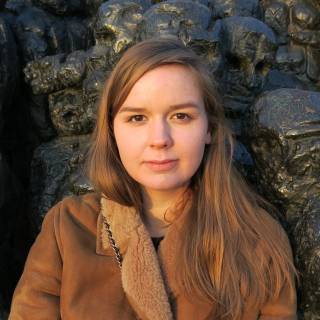 Katrine Rønsig Larsen
Katrine Rønsig Larsen
PhD Student
Katrine Rønsig Larsen is a PhD Student in History at the University of Copenhagen and a visiting researcher at HEX (September-December 2021). Her PhD project examines individual and collective experiences of family violence in Denmark from 1970 to 2020 with a special emphasis on experiences of family violence during the COVID-19 pandemic. Employing a history of experience approach, the project will analyse the historically and culturally contingent experiences of family violence based on interviews, archive material and media archives. Rather than establishing a stable notion of what family violence is and how it is experienced, her dissertation aims to uncover the unstable cultural understandings of violence in the family and to historicise the experience of violence itself.
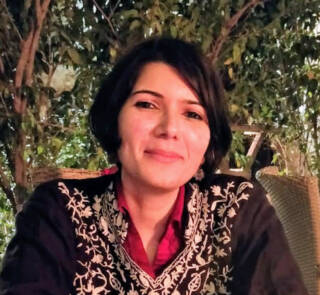 Ranjana Saha
Ranjana Saha
Ranjana Saha is currently a Marie Sklodowska-Curie Actions (MSCA) COFUND Turku Institute for Advanced Studies (TIAS) Turku Intersectoral Excellence Scheme (TIES) Fellow (September 2023-August 2026) associated with the Department of European and World History, University of Turku, Finland. She has been awarded a travel grant by The Finnish Society of Sciences and Letters for conducting research during her Visiting Fellowship (July-August 2024) at The Institute for Advanced Studies in the Humanities (IASH), The University of Edinburgh, Edinburgh, UK. She is working on her project ‘Mothers, Mothercraft & Materialities: Urban India and Transnational Histories of “Scientific” Motherhood in the Nineteenth and Early-Twentieth Centuries’. As a Visiting Scholar at HEX, she is keen to discuss and further develop her current project as well as present her paper on ‘Medicine, Mothercraft & Materialities: ‘Scientific’ Motherhood Advice in Colonial Bengal’ at the HEX Seminar Series on 7 May, 2024. Prior to joining TIAS, she was a Postdoctoral Teaching Fellow and History Faculty at Manipal Centre for Humanities, Manipal (July 2020-July 2023); and a Postdoctoral Research Fellow at the Indian Institute of Science Education and Research (IISER), Mohali, India (May 2018-April 2020). She completed her PhD and MPhil from the Department of History, University of Delhi, Delhi, India. Her doctoral research was funded by a Junior Research Fellowship (JRF) and a Foreign Travel Grant from the Indian Council of Historical Research (ICHR, New Delhi), a Charles Wallace India Trust UK Short-term Research Grant, and a one-year PhD Fellowship at the Centre for the Study of Developing Societies (CSDS, Delhi). She has a MA degree in History from Jawaharlal Nehru University, New Delhi, India, and a BA Hons in History from Lancaster University, Lancaster, U.K. Her papers have been published in The Indian Economic and Social History Review (IESHR), South Asia Research, and Women’s Studies International Forum. She is the author of Modern Maternities (Routledge, 2023).
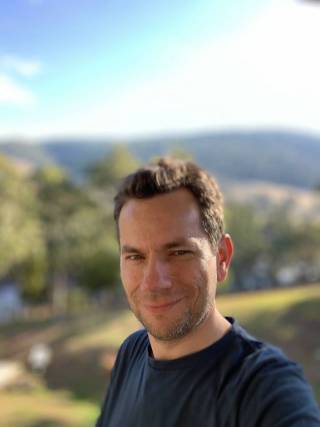 Simon Sleight
Simon Sleight
Simon Sleight (Ph.D, FRHistS) is a visiting scholar from King’s College London where he is Reader in Urban History, Historical Youth Cultures and Australian History. Simon’s work explores the history of urban place-making, the evolution of youth cultures, the presence of the past in contemporary society, and the history of the Australian diaspora. He is particularly interested in understanding the lived experience of the past, and uses a wide range of source material to do so. His book publications include Young People and the Shaping of Public Space in Melbourne, 1870-1914 (Routledge, 2016), Children, Childhood and Youth in the British World (Palgrave, 2016), a textbook on History, Memory and Public Life (Routledge, 2018) and A Cultural History of Youth in the Modern Age (forthcoming with Bloomsbury and co-edited with Kristine Alexander). New research centres on memory and meaning in the modern world and on the concept of ‘slow history’. Simon is also Co-Founding Director of the Children’s History Society and Deputy Director of the Menzies Australia Institute.
On twitter @Slowhistorian
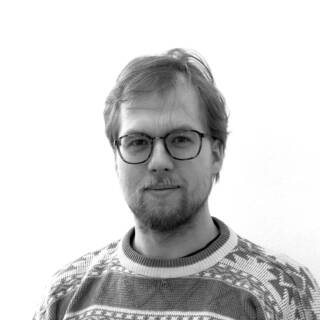 Jiří Smlsal
Jiří Smlsal
Jiří Smlsal is a PhD. student at the Institute of Economic and Social History at Charles University in Prague. His PhD project examines the development of disciplinary institutions, convict labour and correctional thought in Czechoslovakia between the 1930s and 1960s. He is also a member of the research project Punish or Rehabilitate? Gender, Convict Labour, and Disciplination in the Workhouse in the Czech lands, 1918-1950 at the Czech Academy of Science. He is interested in Romani history and recently published a monograph on Holocaust of Roma in Protectorate of Bohemia and Moravia.
 Mikkel Thelle
Mikkel Thelle
Senior Researcher
Mikkel Thelle is a cultural historian and senior researcher at the National Museum of Denmark. Working with urban history and public space for a long period as director of Danish Center for Urban History at Aarhus University, he is now interested in cultural histories of welfare society and the ways in which citizenship is enacted and experienced in 20th century cities. As visiting fellow at HEX, Mikkel is investigating practices of interpellation in Copenhagen’s comparable finnish urban spaces in the 19th and 20th century.
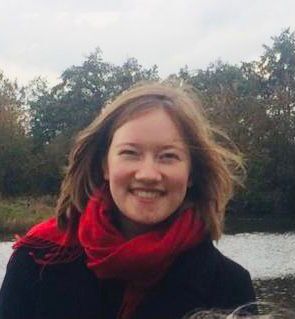 Marie van Haaster
Marie van Haaster
Master´s Student/Research Assistant
Marie van Haaster recently received her Master’s degree in Philosophy (University of Amsterdam) and is pursuing a Research Master in History (Radboud University Nijmegen). She is currently visiting HEX as a research assistent to Rob Boddice. Her research interests lie at the crossroads of the history of experience, the history of medicine, and philosophy of mind and cognition.
 Ella Viitaniemi
Ella Viitaniemi
My research focuses on politics and decision-making in the 18th century, and especially on how issues were resolved at the local level. In my research projects, I have considered the emergence of early political publicity and citizenship in the second half of the 18th century, and have looked especially at parish meetings as a local political arena. On the other hand, I have also studied the demographics, livelihoods and cultural history of early modern society, for example through the lower clergy and mason masters. In general, the 18th century as an era of dynamic changes is a fascinating area of study that inspires us to look at the different life paths and experiences of people as part of the evolving local community, the Swedish kingdom, and European culture.
I lead a project funded by Kone Foundation The long history of short-term work: Short-term work and its creators as part of Finnish society 1450–1860.
I also have also ongoing personal research project “Religion, framsteg och politik: Professor Johan Kraftmans och prosten Mikael Lebells samhälleliga samarbete på 1700-talet [Religion, progress and politics: Social cooperation between Professor Johan Kraftman and Dean Mikael Lebell in the 18th century], funded by Svenska Litteratur Sällskapet i Finland.
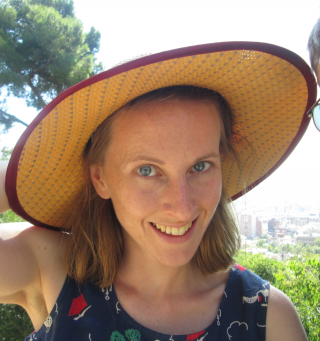 Tessa Whitehouse
Tessa Whitehouse
Tessa Whitehouse directs the Centre for Religion and Literature in English and Queen Mary University of London. She is the author of The Textual Culture of English Protestant Dissent (Oxford, 2015) and co-editor of three edited collections: Textual Transformations (Oxford, 2019), Religion and Life Cycles (Manchester, 2021) and the journal E-Rea on ‘Lived Religion: The Exemplary and Mundane’. Her current research investigates how friendship and letter-writing were used to articulate and mediate theological, literary and emotional aspects of loss and memory. At HEX she will be preparing an edition of the correspondence between Sally Wesley (poet and daughter of one of the founders of Methodism) and Mercy Doddridge (member of a leading family of religious dissenters in Britain).
QMCRLE website: https://www.qmul.ac.uk/sed/religionandliterature/
E-Rea Issue on ‘Lived Religion’: https://journals.openedition.org/erea/10058
Video on William Cowper, Faith and Letters: https://www.youtube.com/watch?v=e9KohiiJE3cpersonal profile page
 Teresa Willenborg
Teresa Willenborg
Teresa Willenborg is a historian and political scientist. She holds a Ph.D. from the University of Hannover (Germany). Her doctoral thesis, published in 2019, examined the nationality policy of the Polish People’s Republic toward the German minority in post-war Lower Silesia.
Currently, she conducts research on the German unaccompanied children in Poland in the aftermath of the Second World War, in cooperation with the University of Kiel (Germany).
The ongoing research project, “German Children in Post-War-Poland” focuses on examining the social care provided to German children in need of protection who remained in Poland after the Second World War and lived in institutional care. The book will be out in the autumn of 2023.
 Tomasz Wislicz
Tomasz Wislicz
Tomasz Wiślicz is an associate professor at the Tadeusz Manteuffel Institute of History of the Polish Academy of Sciences in Warsaw. He specializes in cultural and social history of the early modern peasants. His research focuses on popular religion, individuality/collectivity in rural communities, and history of sexuality, but encompasses also the history of historiography and theory of history.
At HEX Tomasz is investigating the visionary experience through the lens of apparitional discourse in early modern times and beyond.
Website: https://wislicz.wordpress.com/english/
 Whitney Wood
Whitney Wood
Dr. Whitney Wood is Canada Research Chair in the Historical Dimensions of Women’s Health at Vancouver Island University. Her research interests include histories of medicine, health, and the body in modern Canada, with a particular focus on gendered and racialized representations of women’s pain. She is currently working on a history of “natural” childbirth in mid-to-late twentieth century Canada, funded by a Social Sciences and Humanities Research Council of Canada Insight Development Grant. Her work has appeared in Social History of Medicine, BMJ: Medical Humanities, and a number of edited collections, and her first book, Birth Pangs: Maternity, Medicine, and Feminine Delicacy in English Canada, 1867-1940, is under contract with McGill-Queen’s University Press.
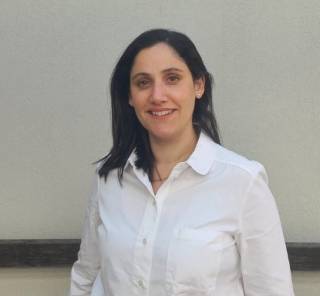 Emma Zohar
Emma Zohar
Emma Zohar is a historian specializing in modern Jewish history, with a focus on Polish Jewry and the history of emotions. She earned her PhD from the Hebrew University of Jerusalem in 2019, where her research explored the intersections of politics, education, and Jewish cultural identity in interwar Poland.
Her two books, both forthcoming during 2025, are The Children of the Place: The Non-Zionist Education System in Interwar Poland (Pardes Publishing), which examines the development of non-Zionist Jewish education in Poland between the wars. Within the Pale of Pleasure: Polish Jewry and the Pursuit of Happiness (Zalman Shazar Center Press), which challenges the prevalent portrayal of Polish Jewry as a perpetually suffering community, using methodologies from the history of emotions to explore consumer culture and leisure in interwar Poland.
Zohar has published extensively, including co-editing a special issue of Zion dedicated to the history of emotions and Jewish history. She has held postdoctoral fellowships at the Max Planck Institute’s Center for the History of Emotions in Berlin and the Interdisciplinary Unit for Polish Studies at the University of Haifa. She is currently a researcher at the Goldstein-Goren Diaspora Research Center at Tel Aviv University and a postdoctoral fellow at the Fanya Gottesfeld Heller Center for the Study of Women in Judaism at Bar-Ilan University.
During her time at HEX, Zohar will embark on a new research project examining Emotional Bridges and diasporic communities, exploring how shared emotional practices shape connections across geographic and cultural divides.

